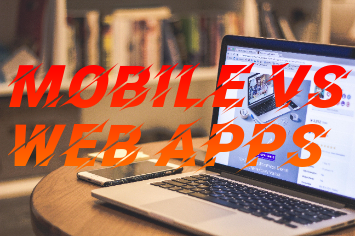
In today’s digital-first economy, having an online presence is non-negotiable. But when it comes to serving your customers and streamlining operations through digital tools, a fundamental question often arises: Should you invest in a mobile app or a web app?
This isn’t a one-size-fits-all answer. Both have distinct advantages and limitations, and the “right” choice hinges entirely on your specific business goals, target audience, and resources. Let’s break down the core differences and help you decide.
Understanding the Contenders
Before weighing the pros and cons, it’s crucial to clarify what each truly entails:
1. Mobile Apps (Native Apps): These are applications specifically designed and developed for a particular mobile operating system, such as iOS (for Apple iPhones/iPads) or Android. You download them from app stores (Apple App Store, Google Play Store) and install them directly onto your device. They live on your phone’s home screen.
- Examples: WhatsApp, Instagram, banking apps, mobile games.
2. Web Apps: These are applications accessed via a web browser (like Chrome, Safari, Firefox) over the internet. They don’t require downloading or installation and run directly within the browser window. They are essentially websites designed to function like an application.
- Examples: Gmail (in a browser), Google Docs, online banking portals, Netflix (accessed via web browser).
The Case for Mobile Apps (Native Apps)
Pros:
- Superior Performance & Speed: Native apps are optimized for specific operating systems, offering faster performance, smoother animations, and a highly responsive user experience.
- Offline Functionality: Many native apps can work, or at least offer limited functionality, even without an internet connection.
- Access to Device Features: They can directly utilize your phone’s hardware capabilities like the camera, GPS, gyroscope, contacts, and push notifications, leading to richer, more integrated experiences.
- Intuitive User Experience (UX): Native apps often follow specific platform guidelines, making them feel more familiar and intuitive to users of that device.
- App Store Presence & Discovery: Being listed in major app stores can boost visibility and credibility.
Cons:
- Higher Development Cost & Time: You typically need separate development teams or significant resources for iOS and Android versions, meaning higher initial costs and longer development cycles.
- Maintenance & Updates: Each platform requires individual updates and maintenance, increasing ongoing costs.
- Requires Installation: Users must download and install the app, which can be a barrier for some.
- App Store Approval: Submitting to app stores involves a rigorous review process, which can delay launch or lead to rejections.
The Case for Web Apps
Pros:
- Cross-Platform Compatibility: A single web app works across all devices and operating systems (Windows, macOS, iOS, Android) as long as there’s a compatible web browser. This significantly reduces development effort.
- Lower Development Cost & Faster Deployment: You develop one version for all platforms, making development generally quicker and more affordable.
- No Installation Required: Users simply access your app via a URL, eliminating the download barrier. This makes it easier to acquire new users.
- Easier Updates & Maintenance: Updates are made on the server side and are immediately available to all users. No need for users to download new versions.
- Better Discoverability (SEO): Web apps are indexed by search engines, meaning users can find your app through Google searches, not just app store searches.
Cons:
- Requires Internet Connection: Full functionality often depends on a stable internet connection.
- Limited Device Access: Web apps generally have restricted access to a device’s native features compared to mobile apps.
- Performance Can Vary: Performance can depend on the user’s browser, internet speed, and device specifications. They might not be as fluid as native apps.
- No App Store Presence: While good for accessibility, it means missing out on discovery through app store searches.
Which is Right for Your Business?
The best choice depends on your strategic priorities:
- Choose a Mobile App if:
- Your primary goal is to offer a highly interactive, personalized, and feature-rich experience that leverages device hardware (camera, GPS, push notifications).
- Your users are expected to use the app frequently and value offline access.
- You have the budget and resources for ongoing development and maintenance for multiple platforms.
- You aim for a strong brand presence within app stores.
- Your target audience already heavily uses native apps for similar services.
- Choose a Web App if:
- Cost-effectiveness and speed to market are critical.
- You need broad accessibility across various devices and operating systems without requiring installation.
- Your core functionality doesn’t heavily rely on specific device hardware.
- You prioritize SEO and web discoverability.
- You want to offer an initial service or Minimum Viable Product (MVP) before investing in native development.
Consider a Hybrid Approach (PWA): Sometimes, the answer lies in the middle. Progressive Web Apps (PWAs) offer the best of both worlds: they are web apps that can be “installed” on a home screen, work offline to some extent, and offer push notifications, providing an app-like feel without the native development overhead. This can be a great starting point for businesses looking for broader reach with enhanced capabilities.
Making Your Decision
Ultimately, the decision between a mobile app and a web app for your business is a strategic one. It requires:
- Understanding Your Audience: Where do they spend their time? What are their expectations?
- Defining Your Goals: What problem are you solving? What business outcomes do you seek?
- Assessing Your Resources: What’s your budget? Do you have access to the right development talent?
By carefully evaluating these factors, you can make an informed choice that sets your business up for digital success. Whether it’s the sleek performance of a native app or the universal accessibility of a web app, the right solution will empower you to connect with your audience effectively and drive your business forward.
